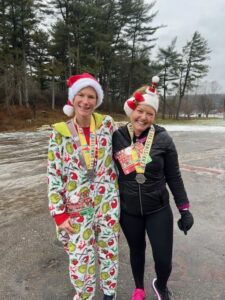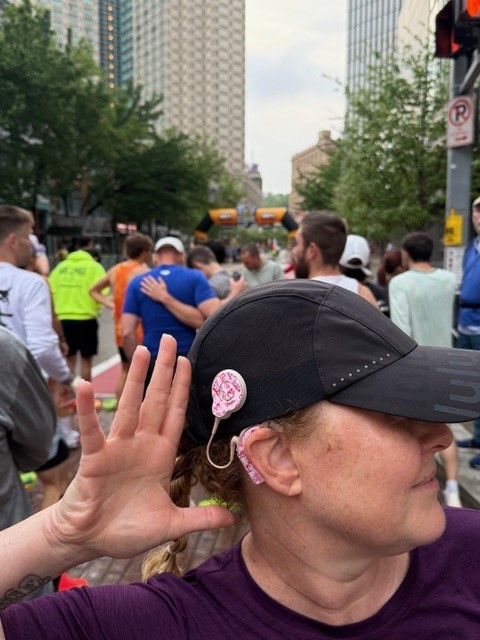When Sally Sherman, PhD, Associate Professor of Practice at Pitt’s Department of Health and Human Development, was watching a photographer take her daughter’s senior pictures in August 2024, she abruptly lost her hearing in one ear.
Sally then spent the next eight hours in the ER trying to get dizziness to subside. Vestibular therapy helped, but the steroid injections failed to bring back her hearing. As a professor, doing her job without all her hearing was very difficult. Referred to audiology, Sally tried the CROS hearing aid system, as she was “against” getting a cochlear implant (CI). “Although it did help, it was not ultimately helping me bring my quality of life back,” she recalled.
Her audiologist told her about Dr. Greg Basura, MD, PhD, who had just joined Pitt as Director of Global Otolaryngology and a professor in the Department of Otolaryngology-Head & Neck Surgery. One meeting with him, and she was pushing to get a CI as quickly as she could. “As an Ironman triathlete, ultramarathoner, and cyclist, I was desperate to get my life back,” Sally said. “I was finding I was unable to keep myself safe in the outdoors!”
Initially, Sally saw getting surgery on her skull as very risky and unnecessary. Since she had a high school senior, she was afraid she would spend her daughter’s last year at home recovering from a surgery. “Honestly, it felt like an extreme choice to put a device in my head!”
Dr. Basura went over all the risks with her and put her mind at ease, telling her the risks of not having the surgery and explaining that her fears were unfounded. Sally was already isolating herself and concerned about that increasing her risk of dementia. “With all of us losing hearing as we age, I started to realize that I needed to start with as much hearing as I could since my ‘good ear’ would eventually lose hearing too,” she said.
Dr. Basura updated Sally on the research about the impact of CIs and told her how simple a procedure it would be. “He also is active himself and was very encouraging about how soon I would be back to being active after my surgery,” Sally said. “He was right! It did not slow me down one bit.”

The surgery was the day before Christmas Eve in 2024. Sally had already signed up for a Christmas Eve 5K with a huge group of friends, so she was committed to at least showing up at the event, bandages and ear protection in tow. Dr. Basura told her she could be physically active at a lower intensity until she healed. The morning after the surgery, she felt great. She went to the 5K and walked the race with her friends. Her husband and daughter bought a Christmas bow from CVS to adorn her gauze.
Activated in January, Sally has been working to get the most out of her CI that she can. She called it life changing. “It’s not the life I had before, it’s just different,” she added. “There is such a focus on getting your hearing back the way it was. I found it to be so much more impactful to instead appreciate the new way of hearing that I have now. With my CI, I do not isolate myself anymore. I don’t avoid situations because of my hearing. I am back out in the world as I was before. Not the same, but just different.”
Sally also participated in Dr. Basura’s single-sided deafness study. She had told Dr. Basura to let her know if he needed her as a research participant, because she wants to do everything she can to support research in this area. As a researcher herself, she knows how tough it is to recruit for studies and wants to give back to science as much as she can.
To this day, Sally often sends Dr. Basura pictures to show him that she is indeed living out her life: climbing mountains, swimming, racing, and riding bikes – “basically everything I was doing before, but now with a CI,” she said.
